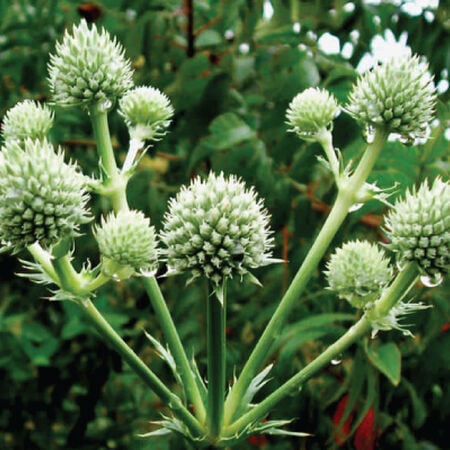Rattlesnake Master, Eryngium Seeds
Key Attributes
Key Attributes
Product Details
Weight
0.01Depth
0.15Height
4.5Width
3.25Plant Height
40-46"Botanical Name
Eryngium yuccifoliumSeed Type
SeedAdditional Characteristics
Attracts Pollinators, Attracts Birds, Deer Resistant, Extended Blooms, Erosion ControlSeeds Per Gram
776Seeds Per Pound
352,000Packet
100 SeedsSow Depth
1/8"Seeds Per Ounce
22,000Breed
Open-pollinatedSun
Full SunUses
Cut FlowersLife Cycle
PerennialSow Method
TransplantCategories
FlowersDays To Maturity (# Days)
365Components
Growing Instructions
![]() Learning Download: How to Grow Eryngium
Learning Download: How to Grow Eryngium
Eryngium, also known as sea hollies, produce beautiful flowers that make a garden look unique and fascinating. They have spiny leaves and they bloom in clusters with teasel-like blossoms.
Before Planting: Sow Eryngium seeds indoors 10 to 16 weeks before the last frost. Light is required for the seeds to germinate, so do not cover them with soil. Harden the transplants off and move them outside after the last frost.
Planting: If Eryngium are sown directly into the garden, they may not bloom their first year. Prior to planting, use a warm stratification process for one month followed by cold stratification for one month, as well.
Watering: Eryngium does not require much watering, as it is drought tolerant and only needs to be watered during dry periods.
Fertilizer: Do not fertilize Eryngium as fertilizer can make the flowers spread and appear droopy.
Days to Maturity: Eryngium plants will bloom from July through September.
Harvesting: The plant’s flowers make excellent dried flowers as they keep their unique and vibrant color even after picked, and even after they have dried. The flowers should be cut when the cones are blue or white, depending on the variety.
Tips: once the flowers’ blooming period ends in the fall, cut the flowering stalks back, but leave the evergreen foliage.
Shipping Schedule
Our Seed Promise
 "Agriculture and seeds" provide the basis upon which our lives depend. We must protect this foundation as a safe and genetically stable source for future generations. For the benefit of all farmers, gardeners and consumers who want an alternative, we pledge that we do not knowingly buy or sell genetically engineered seeds or plants.
"Agriculture and seeds" provide the basis upon which our lives depend. We must protect this foundation as a safe and genetically stable source for future generations. For the benefit of all farmers, gardeners and consumers who want an alternative, we pledge that we do not knowingly buy or sell genetically engineered seeds or plants.
The mechanical transfer of genetic material outside of natural reproductive methods and between genera, families or kingdoms, poses great biological risks as well as economic, political, and cultural threats. We feel that genetically engineered varieties have been insufficiently tested prior to public release. More research and testing is necessary to further assess the potential risks of genetically engineered seeds. Further, we wish to support agricultural progress that leads to healthier soils, to genetically diverse agricultural ecosystems, and ultimately to healthy people and communities.
To learn more about the "Safe Seed Pledge" please visit www.councilforresponsiblegenetics.org.

